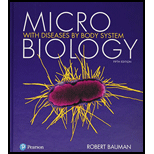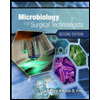
Microbiology with Diseases by Body System (5th Edition)
5th Edition
ISBN: 9780134477206
Author: Robert W. Bauman Ph.D.
Publisher: PEARSON
expand_more
expand_more
format_list_bulleted
Textbook Question
Chapter 10, Problem 5MC
Cross resistance is _____.
- a. the deactivation of an antimicrobial agent by a bacterial enzyme
- b. alteration of the resistant cells so that on antimicrobial agent cannot attach
- c. the mutation of genes that affect the cytoplasmic membrane channels so that antimicrobial agents cannot cross into the cell’s interior
- d. resistance to one antimicrobial agent because of its similarity to another antimicrobial agent
Expert Solution & Answer
Want to see the full answer?
Check out a sample textbook solution
Students have asked these similar questions
would this be considered a novel protein and if not how can I fix it so it is and can you draw the corrections please
In as much detail as possible, hand draw a
schematic diagram of the hypothalamic-pituitary-
gonad (HPG) axis in the human male. Be sure to
include all the relevant structures and hormones.
You must define all abbreviations the first time
you use them. Please include (and explain) the
feedback loops.
A negligence action was brought by a mother against a hospital on behalf of her minor daughter. It alleged that when the mother was 13 years of age, the hospital negligently transfused her with Rh-positive blood. The mother's Rh-negative blood was incompatible with and sensitized by the Rh-positive blood. The mother discovered her condition 8 years later during a routine blood screening ordered by her healthcare provider in the course of prenatal care. The resulting sensitization of the mother's blood allegedly caused damage to the fetus, resulting in physical defects and premature birth.
Did a patient relationship with the transfusing hospital exist?
Chapter 10 Solutions
Microbiology with Diseases by Body System (5th Edition)
Ch. 10 - Prob. 1TMWCh. 10 - Some antimicrobial drugs are harmful to humans....Ch. 10 - Antibiotic Overkill A young woman was taking...Ch. 10 - Prob. 2CCSCh. 10 - Prob. 3TMWCh. 10 - Why is it incorrect to say that an individual...Ch. 10 - Prob. 1EDCSCh. 10 - Prob. 3CCSCh. 10 - Prob. 1MCCh. 10 - In a Kirby-Bauer susceptibility test, the presence...
Ch. 10 - Prob. 3MCCh. 10 - Prob. 4MCCh. 10 - Cross resistance is _____. a. the deactivation of...Ch. 10 - Prob. 6MCCh. 10 - Prob. 7MCCh. 10 - Prob. 8MCCh. 10 - Prob. 9MCCh. 10 - Prob. 10MCCh. 10 - Label each figure below to indicate the class of...Ch. 10 - What specific test for antimicrobial efficacy is...Ch. 10 - What characteristics would an ideal...Ch. 10 - Prob. 2SACh. 10 - Why is the fact that drug Z destroys the NAM...Ch. 10 - Given that both human cells and pathogens...Ch. 10 - Prob. 5SACh. 10 - Prob. 6SACh. 10 - Prob. 7SACh. 10 - Prob. 8SACh. 10 - Compare and contrast the actions of polyenes,...Ch. 10 - Prob. 10SACh. 10 - Prob. 1CTCh. 10 - How does Penicillium escape the effects of the...Ch. 10 - How might a colony of Bacillus licheniformis...Ch. 10 - Fewer than 1 % of known antibiotics have any...Ch. 10 - In an issue of News of the Lepidopterists Society,...Ch. 10 - Even though aminoglycosides such as gentamicin can...Ch. 10 - Prob. 7CTCh. 10 - Prob. 8CTCh. 10 - Why might amphotericin B affect the kidneys more...Ch. 10 - Antiparasitic drugs in the benzimidazole family...Ch. 10 - Prob. 11CTCh. 10 - Scientists have cultured bacteria isolated from...Ch. 10 - Prob. 13CTCh. 10 - Prob. 14CTCh. 10 - Enterococcus faecium is frequently resistant to...Ch. 10 - Prob. 1CM
Knowledge Booster
Learn more about
Need a deep-dive on the concept behind this application? Look no further. Learn more about this topic, biology and related others by exploring similar questions and additional content below.Similar questions
- 18. Watch this short youtube video about SARS CoV-2 replication. SARS-CoV-2 Life Cycle (Summer 2020) - YouTube.19. What is the name of the receptor that SARS CoV-2 uses to enter cells? Which human cells express this receptor? 20. Name a few of the proteins that the SARS CoV-2 mRNA codes for. 21. What is the role of the golgi apparatus related to SARS CoV-2arrow_forwardState the five functions of Globular Proteins, and give an example of a protein for each function.arrow_forwardDiagram of check cell under low power and high powerarrow_forward
- a couple in which the father has the a blood type and the mother has the o blood type produce an offspring with the o blood type, how does this happen? how could two functionally O parents produce an offspring that has the a blood type?arrow_forwardWhat is the opening indicated by the pointer? (leaf x.s.) stomate guard cell lenticel intercellular space none of thesearrow_forwardIdentify the indicated tissue? (stem x.s.) parenchyma collenchyma sclerenchyma ○ xylem ○ phloem none of thesearrow_forward
- Where did this structure originate from? (Salix branch root) epidermis cortex endodermis pericycle vascular cylinderarrow_forwardIdentify the indicated tissue. (Tilia stem x.s.) parenchyma collenchyma sclerenchyma xylem phloem none of thesearrow_forwardIdentify the indicated structure. (Cucurbita stem l.s.) pit lenticel stomate tendril none of thesearrow_forward
- Identify the specific cell? (Zebrina leaf peel) vessel element sieve element companion cell tracheid guard cell subsidiary cell none of thesearrow_forwardWhat type of cells flank the opening on either side? (leaf x.s.) vessel elements sieve elements companion cells tracheids guard cells none of thesearrow_forwardWhat specific cell is indicated. (Cucurbita stem I.s.) vessel element sieve element O companion cell tracheid guard cell none of thesearrow_forward
arrow_back_ios
SEE MORE QUESTIONS
arrow_forward_ios
Recommended textbooks for you
 Human Physiology: From Cells to Systems (MindTap ...BiologyISBN:9781285866932Author:Lauralee SherwoodPublisher:Cengage LearningEssentials of Pharmacology for Health ProfessionsNursingISBN:9781305441620Author:WOODROWPublisher:Cengage
Human Physiology: From Cells to Systems (MindTap ...BiologyISBN:9781285866932Author:Lauralee SherwoodPublisher:Cengage LearningEssentials of Pharmacology for Health ProfessionsNursingISBN:9781305441620Author:WOODROWPublisher:Cengage Biology (MindTap Course List)BiologyISBN:9781337392938Author:Eldra Solomon, Charles Martin, Diana W. Martin, Linda R. BergPublisher:Cengage Learning
Biology (MindTap Course List)BiologyISBN:9781337392938Author:Eldra Solomon, Charles Martin, Diana W. Martin, Linda R. BergPublisher:Cengage Learning Microbiology for Surgical Technologists (MindTap ...BiologyISBN:9781111306663Author:Margaret Rodriguez, Paul PricePublisher:Cengage Learning
Microbiology for Surgical Technologists (MindTap ...BiologyISBN:9781111306663Author:Margaret Rodriguez, Paul PricePublisher:Cengage Learning

Human Physiology: From Cells to Systems (MindTap ...
Biology
ISBN:9781285866932
Author:Lauralee Sherwood
Publisher:Cengage Learning

Essentials of Pharmacology for Health Professions
Nursing
ISBN:9781305441620
Author:WOODROW
Publisher:Cengage

Biology (MindTap Course List)
Biology
ISBN:9781337392938
Author:Eldra Solomon, Charles Martin, Diana W. Martin, Linda R. Berg
Publisher:Cengage Learning

Microbiology for Surgical Technologists (MindTap ...
Biology
ISBN:9781111306663
Author:Margaret Rodriguez, Paul Price
Publisher:Cengage Learning


USMLE-Rx Antimicrobial Therapy; Author: USMLE-Rx;https://www.youtube.com/watch?v=Pka1Ynlrqtw;License: Standard Youtube License